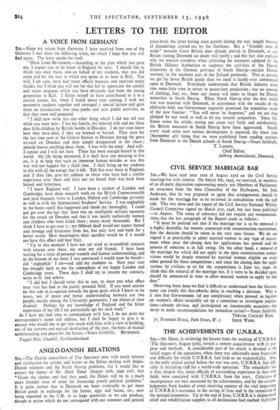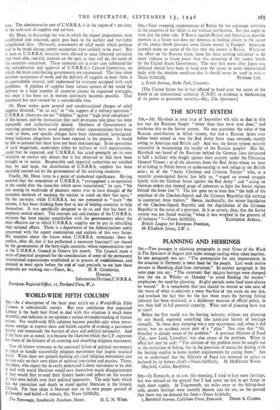THE ACHIEVEMENTS OF U.N.R.R.A.
Snt,—Mr. Henn, in reviewing the lessons from the working of U.N.R.R.A. (The Spectator, August 3oth), reveals a remote acquaintance with its pur- pose and _ methods. A considerable part of his article is devoted to the initial stages of the operations, when there was admittedly some frustration and difficulty for which U.N.R.R.A. had little or no responsibility. Also, in the early critical period before the war was over, U.N.R.R.A. had diffi- culty in recruiting staff for a world-wide operation. The remarkable fact is that,. despite this, many officials of outstanding experience in their own fields were associated with U.N.R.R.A. from the start.. Criticisms of incompetence are best answered by the achievements, and by the acluxar- , ledgments from leaders of every receiving country of the vital importance of U.N.R.R.A.'s assistance in the saving of lives and in the restoration of the national economies. Up to the end of June, U.N.R.R.A.'s shipments of relief and rehabilitation supplies to all destinations had reached r2,855,000
tons. The administrative cost of U.N.R.R.A. is in the region oft per cent. of the total cost of supplies and services.
Mr. Henn, in discussing the way in which the import programmes were established and executed, again goes back to the earliest and inevitably complicated days. Obviously, assessments of relief needs which perforce had to be made during enemy- occupation were unlikely to be exact. But as soon as U.N.R.R.A. missions were allowed to enter liberated territories they were able, and did, examine on the spot, as they still do, the needs of the countries concerned. These estimates are in every case submitted for the consideration and approval of U.N.R.R.A.'s Central Committee, on which thk main contributing governments are represented. The time taken between acceptance of needs and the delivery of supplies to meet them is an unavoidable interval, well understood by everyone occupied with such problems. A pipeline of supplies from various corners of the world for delivery to a large number of countries cannot be organised overnight, but once it has been set in motion continuity becomes possible. That continuity has now existed for a considerable time.
Mr. Henn makes quite general and unsubstantiated charges of relief supplies diverted, " let us say," to " the support of a military operation." U.N.R.R.A. observers are not " helpless " against " high level conspiracy " of this nature, and the insinuation that such diversions take place has been repeatedly and authoritatively denied. Members of Governments in receiving countries have acted promptly when representations have been made to them, and specific charges have been immediately investigated. Some ludicrous allegations have been exposed in the process. It would be idle to pretend that there have not been shortcomings. In no operations of such magnitude, undertaken either by military or civil organisations, could that be expected, and U.N.R.R.A. has acted promptly on its own initiative to correct any abuses that it has observed or that have been brought to its notice. Responsible and impartial authorities are satisfied that, by and large, the distribution of U.N.R.R.A. supplies has been equitably carried out by the governments of the receiving countries.
Finally, Mr. Henn turns to a point of undoubted significance. Having asserted that the conception of U.N.R.R.A. " presupposed a co-operation in the world after the cease-fire which never materialised," he says, " No one among its multitude of planners seems ever to have thought of the economic methods of teaching the nations to stand on their feet again." On the coi'trary, while U.N.R.R.A. has net presumed to " teach "'the nations, it has been thinking from first to last of helping countries to help themselves. It was specifically -designed to do so, and that has been its emphatic central object. The constant aim and practice of the U.N.R.R.A. missions has been regular consultation with the governments about the most effective use to which U.N.R.R.A. supplies can be put in rebuilding their national affairs. There is a department of the Administration solely concerned with the expert examination and analysis of this very factor. His anxieties about the future when U.N.R.R.A. terminates (does he confess, after all, that it has performed a necessary function?) are shared by the governments of the forty-eight countries whose representatives met at the U.N.R.R.A. Council in Geneva last month. The Council made a series of practical proposals for the consideration of some of the permanent international organisations established or in process of establishment, and planned to meet again before the end of 1946 precisely to see how these
proposals are working out.—Yours, &c., H. R. CUMMINGS,
Director, ' Information Division,U.N.R.R.A.
European RegionalOffice, zz, Portland Place, W.,z.



























 Previous page
Previous page